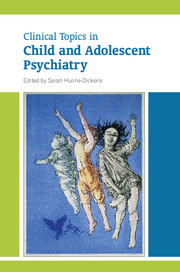Book contents
- Frontmatter
- Contents
- List of tables
- List of boxes
- List of figures
- List of contributors
- Preface
- 1 Child psychiatry and the people who have shaped it
- 2 Fabrication and induction of illness in children
- 3 Personality disorders as disorganisation of attachment and affect regulation
- 4 Post-traumatic stress disorder and attachment: possible links with borderline personality disorder
- 5 Management of antisocial behaviour in childhood
- 6 Pharmacology for attention-deficit hyperactivity disorder, Tourette syndrome and autism spectrum disorder
- 7 Pharmacology for anxiety and obsessive–compulsive disorders, affective disorders and schizophrenia
- 8 Pharmacological management of core and comorbid symptoms in autism spectrum disorder
- 9 Pharmacological treatment of depression and bipolar disorder
- 10 Cognitive–behavioural therapy with children, young people and families: from individual to systemic therapy
- 11 Anxiety disorders
- 12 Somatising: clinical presentations and aetiological factors
- 13 Somatising: management and outcomes
- 14 Evaluating psychological treatments for children with autism
- 15 Attention-deficit hyperactivity disorder: assessment and treatment
- 16 Schizophrenia
- 17 Tourette syndrome
- 18 Sleep disorders
- 19 Self-harm in adolescents
- 20 Adolescent substance misuse: an update on behaviours and treatments
- 21 Eating disorders
- 22 Gender dysphoria in young people
- 23 The psychiatry of children aged 0–4
- Index
15 - Attention-deficit hyperactivity disorder: assessment and treatment
Published online by Cambridge University Press: 02 January 2018
- Frontmatter
- Contents
- List of tables
- List of boxes
- List of figures
- List of contributors
- Preface
- 1 Child psychiatry and the people who have shaped it
- 2 Fabrication and induction of illness in children
- 3 Personality disorders as disorganisation of attachment and affect regulation
- 4 Post-traumatic stress disorder and attachment: possible links with borderline personality disorder
- 5 Management of antisocial behaviour in childhood
- 6 Pharmacology for attention-deficit hyperactivity disorder, Tourette syndrome and autism spectrum disorder
- 7 Pharmacology for anxiety and obsessive–compulsive disorders, affective disorders and schizophrenia
- 8 Pharmacological management of core and comorbid symptoms in autism spectrum disorder
- 9 Pharmacological treatment of depression and bipolar disorder
- 10 Cognitive–behavioural therapy with children, young people and families: from individual to systemic therapy
- 11 Anxiety disorders
- 12 Somatising: clinical presentations and aetiological factors
- 13 Somatising: management and outcomes
- 14 Evaluating psychological treatments for children with autism
- 15 Attention-deficit hyperactivity disorder: assessment and treatment
- 16 Schizophrenia
- 17 Tourette syndrome
- 18 Sleep disorders
- 19 Self-harm in adolescents
- 20 Adolescent substance misuse: an update on behaviours and treatments
- 21 Eating disorders
- 22 Gender dysphoria in young people
- 23 The psychiatry of children aged 0–4
- Index
Summary
Attention-deficit hyperactivity disorder (ADHD) is a heterogeneous neurobehavioural syndrome with a multifactorial aetiology, present since early childhood and commonly having other conditions comorbid with it. The essential components are extreme and impairing inattention, hyperactivity and impulsivity. It is four times more common in boys, so the male pronoun is used in this chapter.
In the UK, the syndrome is recognised as equivalent to the combined presentation type of ADHD in the American DSM-5 (American Psychiatric Association, 2013). This comprises both hyperactive/impulsive and inattentive symptoms. In the USA, additional DSM-5 subtypes of predominantly inattentive presentation and predominantly hyperactive/ impulsive presentation are recognised, but this practice is less prevalent in the UK, although the unofficial term ‘attention-deficit disorder’ (equivalent to ADHD – predominantly inattentive presentation) is used in some educational documents. The standards for UK diagnostic practice are often more stringently applied than in the USA, and generally correspond to the ICD-10 criteria for hyperkinetic disorder, which is essentially a severe form of combined ADHD (World Health Organization, 1992). The UK prevalence rate for combined ADHD is just under 5%, at 3–4% in boys and just under 1% in girls (Ford et al, 2003). The overall UK rate for hyperkinetic disorder is about 1.5%, with a similar male excess (Meltzer et al, 2000). There is widespread underdiagnosis.
Inattention is a broad concept that refers not just to difficulties in focusing and sustaining attention but includes vulnerability to distraction and poor self-organisation. This results in careless mistakes and a failure to follow through satisfactorily on set tasks, particularly if these contain cognitive demands. Typically, tasks are left unfinished, and the affected individual is likely to be demonstrably distractible.
Hyperactivity refers to a general increase in the tempo and amount of apparently purposeful but ineffectual activity, as well as an increase in the number of purposeless, minor movements (fidgeting) or whole-body movements (restlessness). It includes excessive talkativeness and noisiness.
Impulsiveness is characterised by sudden unconsidered actions: repeatedly interrupting others, blurting out answers prematurely in class, failure to wait for one's turn and butting into other people's activities. It commonly has a quality of impatient social disinhibition. In some individuals it is mainly evident in reckless behaviour; things are done suddenly without heed for danger or adverse consequences.
- Type
- Chapter
- Information
- Clinical Topics in Child and Adolescent Psychiatry , pp. 231 - 245Publisher: Royal College of PsychiatristsPrint publication year: 2014



